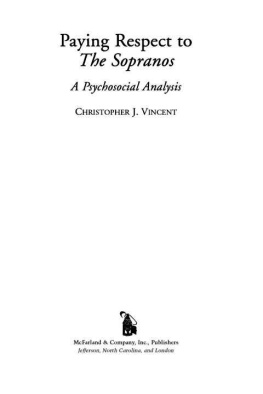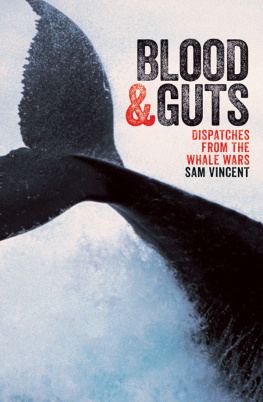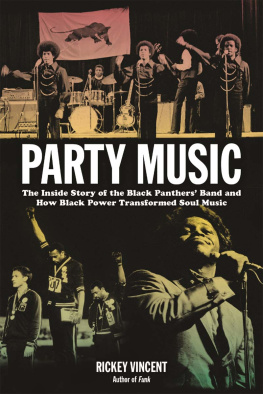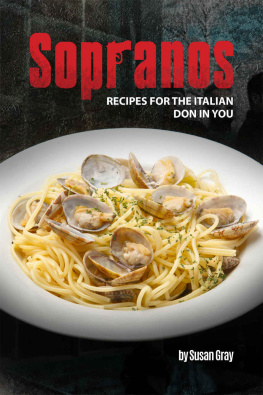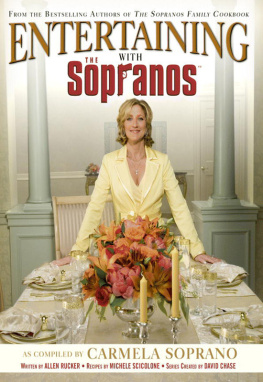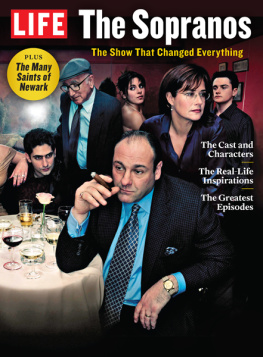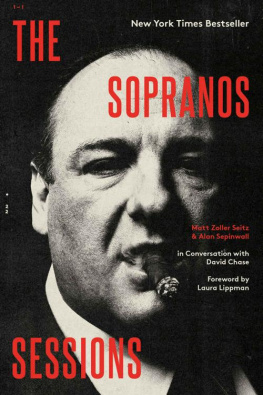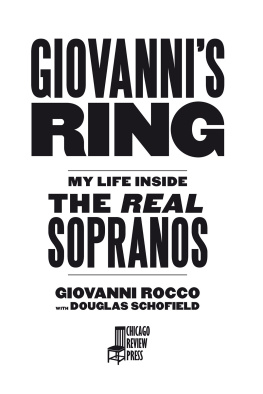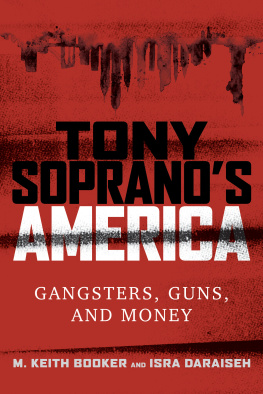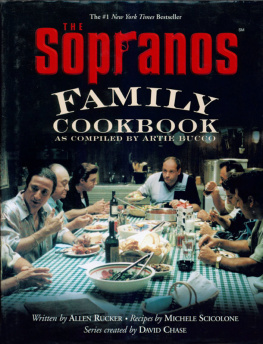A Psychosocial Analysis
CHRISTOPHER J. VINCENT



I'd like to thank my parents, Veronica Vincent and Robert Wertheimer, for their immeasurable support.
Thanks to Mr. Tim Prosser and Mr. Michael Duffy, for opening my eyes to meaning in literature. Thanks to Dr. Sylvester Kreilein for linguistic consultation.
For their perspectives and support, I'd like to thank all of the wonderful HBO.com message boarders, but especially Sfogliatella, MankindTGA, newsgrrll2, BabylonDon, 50Bi11, mhodnov, macaroniand- gravy, shablap, jenjen8788 and allieboy.
Thanks to Diego Viturro, Scott Runde and Derrick Juengst for their valuable and much appreciated feedback.
Thanks to my family, the Aratas, for their enthusiasm - especially my grandmother Dorothy Arata.
I'd like to thank the inventor of the Digital Video Recorder.
Special thanks to my "Soprano daddy," Greg Youra, for introducing me to The Sopranos experience and...
A very special thanks to Lisa Frey for giving me the push to write this book.
I'd also like to thank all the members of the creative team behind the scenes of The Sopranos, who deserve as much credit as those on screen. Of course there is David Chase (creator, executive producer, writer, director) but I'd like to acknowledge the phenomenal family that created the greatest art of the twenty-first century -Robin & Mitchell Burgess (writers, executive producers), Terence Winter (writer, executive producer, director), William B. Stitch, A.C.E. (editor), Bob Shaw (production designer), Phil Abraham (director of photography), Gianna Maria Smart (producer), Andrew Schneider (supervising producer, writer), Matthew Weiner (writer, executive producer), Tim Van Patten (director, executive producer), Brad Grey (executive producer), Frank Renzulli (writer, producer), Henry Bronchtein (writer, director, unit production manager and co-executive producer), Martin Bruestle (producer), Georgianne Walken, C.S.A., and Sheila Jaffe, C.S.A.(casting), Ilene Landress (executive producer), Diane Frolov (writer, supervising producer), John Patterson (director), Alan Taylor (director), Allen Coulter (producer, director) Peter Bucossi (stunts), Dan Castleman (technical consultant), Juliet Polcsa (costume designer), Kathryn Dayak (music editor) and all other members of the crew.

v
Chapter 179
Friends, Romans, countrymen -Howyoudoin'? If you're like me, you miss The Sopranos. For eight years Tony Soprano and his New Jersey family became an extension of our own families. We shared their joys and their sorrows. We soared to unprecedented and unimagined heights of entertainment combined with meaning. The Sopranos transcended our concepts of the possibilities of a weekly one-hour drama. Its absence from the pinnacle of the television landscape and also our lives has been felt deeply by us all. This volume celebrates the incomparable HBO program by studying its unique creative palette, demystifying its subtle messages and meanings, and eulogizing its wonderfully complicated characters. In short, I have come both to bury Caesar and to praise him.
I am convinced that The Sopranos is the greatest American art of the twenty-first century. It goes beyond gangster genre, family drama, psychological study, sociological portrait and any other attempt at classification. It is a complex universe -a tapestry of human behavior, emotion and motivation. The tone of The Sopranos does not dictate morals and meanings. Rather, it simply presents pieces of a puzzle and lets the viewer do the work of putting them together. No two people have exactly the same interpretation of the show and that is a testament to its artistic power and merit. I believe that it holds, for everyone, a key to greater understanding of their lives and the world in which they live. Whether regarding family relationships, work-related stress, the climate of American society, or personal demons - it's all in there if you're willing to unpack it, and that's exactly what I undertake in the following pages.
Unlike Tony Soprano, I was fortunate enough to get in on the ground floor-as a fan of this unparalleled phenomenon in 1999. I and millions of other people were introduced to the most engaging, exhilarating, provocative and downright entertaining television show of our lives. First, the realistic portrayal of working organized criminals intrigued me. Then, its characters endeared themselves to me. The unique tempi of storytelling seduced me. And it was funny! It touched thoughts and feelings in its audience that networks had discarded as unprofitable. It had an appealing like-mindedness, acutely aware of a previously under-represented American zeitgeist. Season after season I became more obsessed with Tony Soprano and his two families. I watched episodes over and over again, each time picking up on a finer nuance and each time finding more appreciation for the richness of this story. The writing, the acting, the directing, the sets, the costumes, the music - all contributed to my fascination with this familiar yet entirely original world that came from the mind of its creator, David Chase. The Sopranos kept its audience in laughter, tears, terror and always on the edge of its seats.
My intentions in this book are twofold. First, to add an element of closure to the Sopranos experience but also to rekindle in you the fire for Tony Soprano and his family. I hope to show you things in The Sopranos that you had not seen before and to give you the tools to make your own insights and personal connections. Second, I will make a cohesive presentation of the themes and messages of the series. I will lay out a concept blueprint and proceed to illustrate how characters and key events fit into this scheme. I weave together the myriad of seemingly unrelated aspects to show you how, together, they form a monument that demarcates the American experience at the beginning of the third millennium. My intention is not to give you all the answers because such a proposition is ridiculous. Rather, the goal is to get you to ask the right questions.
Such compelling art as The Sopranos has inspired analytical works before mine. The insightful perspective from Maurice Yacowar in The Sopranos on the Couch and those essays collected and edited by David Lavery (This Thing of Ours, Investigating The Sopranos and Reading The Sopranos, Hit TV from HBO) are excellent examples. Other notable works include Gabbard's The Psychology ofThe Sopranos, Green and Vernezze's The Sopranos and Philosophy-IKill ThereforeJAm, and Schneider's Tony Soprano on Management. After fueling my own fire with these and other books, I felt that there were still greater depths to be plumbed. The majority of existing Sopranos literature is either collected short essays, episode guides or analysis within a specific scholarly field. This volume presents a breadth and coherency afforded by a single author unrestricted by the boundaries of any single discipline. Most importantly, this volume deals with the finale of the series. Tony's journey has been a long and winding one. Previous works dealt with the fascinating stops along the way. This one, though, is the only book to have the perspective of the entire run of the series, right up to the final stop where we all got off in the summer of 2007.

